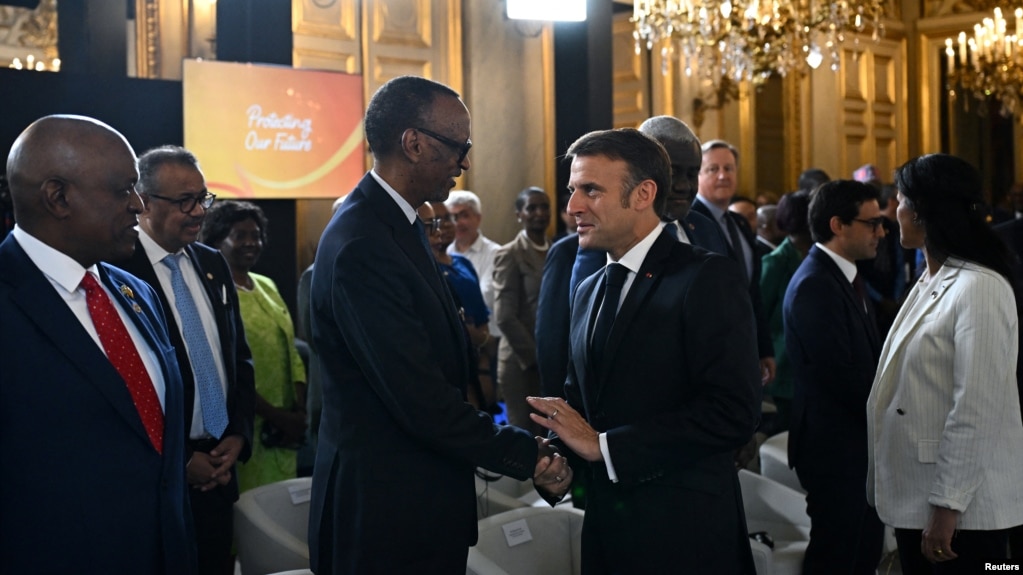June 20, 2024
By VOA News

French President Emmanuel Macron, right, welcomes Rwanda's President Paul Kagame to the Global Forum for Vaccine Sovereignty and Innovation at the French Foreign Ministry in Paris, June 20, 2024. Macron and African leaders are working to make vaccines more available in Africa.
African leaders and French President Emmanuel Macron have partnered on an approximately $1-billion project to make vaccines more available in Africa after the COVID-19 pandemic revealed global inequity in vaccine access.
The project, known as the African Vaccine Manufacturing Accelerator, will provide financial incentives to vaccine manufacturers. The project comes after African leaders and advocates said the continent was overlooked in terms of treatments, testing materials and vaccines during the early months of COVID-19.
According to Gavi, the Vaccine Alliance — a public-private partnership that provides vaccines to developing countries — the project plans to accelerate Africa's manufacturing capacity, generate more activity in global vaccine markets, and enhance preparedness for pandemics.
According to Macron, about 75% of the funding will come from Europe. France will contribute $100 million. Other donors include Germany, the United Kingdom, the United States, Canada, Norway, Japan and the Gates Foundation.
"When the next pandemic hits, even if our leaders in the rich Western countries are angels, the pressure to hold onto your own vaccines for your own people is always going to be irresistible," British Foreign Secretary David Cameron told the summit.
Only 2% of vaccines in Africa are made on the continent. The African Union wants to raise that percentage to 60% by 2040.
Cholera has recently resurged in Africa, underscoring the need for local vaccine providers. Currently, only EuBiologics, a South Korean company, makes cost-efficient and effective vaccines for cholera. Cameron said South African firm Biovac would begin producing cholera vaccines.
The World Health Organization, along with others, also hopes to see Africa better prepared for the next pandemic. At the outset of the virus, South Africa was the only country in Africa able to develop vaccines.
The WHO recently attempted to develop a "pandemic treaty" designed to improve pandemic preparedness. The plan failed largely due to disagreements about disseminating information on the pathogens that cause epidemics and remedies for them.
Negotiators will continue to work for the next meeting in 2025.
African leaders and French President Emmanuel Macron have partnered on an approximately $1-billion project to make vaccines more available in Africa after the COVID-19 pandemic revealed global inequity in vaccine access.
The project, known as the African Vaccine Manufacturing Accelerator, will provide financial incentives to vaccine manufacturers. The project comes after African leaders and advocates said the continent was overlooked in terms of treatments, testing materials and vaccines during the early months of COVID-19.
According to Gavi, the Vaccine Alliance — a public-private partnership that provides vaccines to developing countries — the project plans to accelerate Africa's manufacturing capacity, generate more activity in global vaccine markets, and enhance preparedness for pandemics.
According to Macron, about 75% of the funding will come from Europe. France will contribute $100 million. Other donors include Germany, the United Kingdom, the United States, Canada, Norway, Japan and the Gates Foundation.
"When the next pandemic hits, even if our leaders in the rich Western countries are angels, the pressure to hold onto your own vaccines for your own people is always going to be irresistible," British Foreign Secretary David Cameron told the summit.
Only 2% of vaccines in Africa are made on the continent. The African Union wants to raise that percentage to 60% by 2040.
Cholera has recently resurged in Africa, underscoring the need for local vaccine providers. Currently, only EuBiologics, a South Korean company, makes cost-efficient and effective vaccines for cholera. Cameron said South African firm Biovac would begin producing cholera vaccines.
The World Health Organization, along with others, also hopes to see Africa better prepared for the next pandemic. At the outset of the virus, South Africa was the only country in Africa able to develop vaccines.
The WHO recently attempted to develop a "pandemic treaty" designed to improve pandemic preparedness. The plan failed largely due to disagreements about disseminating information on the pathogens that cause epidemics and remedies for them.
Negotiators will continue to work for the next meeting in 2025.
As big pharma exits Nigeria, asthma patients face spiralling costs
The price of asthma inhalers has more than doubled amid scarcity and added costs after GSK exited the Nigerian market in 2023.
No comments:
Post a Comment